by
D.H. WangD.H. Wang
Biological homeostasis is maintained via intact function of an array of molecules detecting changes of microenvironments inside and outside of the biological system. These molecules including cell membrane proteins and ion channels are intimately involved in a variety of sensory pathways and respond to environmental stimuli, including altered temperature, pH, mechanical and osmotic stress, intra- and extracellular messengers, as well as changes in energy consumption. All of these modalities are involved in systemic, cellular, and molecular regulation. A better understanding of the structural, functional, and physiological properties of these proteins/ion channels would provide insight into mechanisms underlying disease processes, as well as facilitate fabrication of precisely defined, nanostructured interfacial architectures or molecular electronics that express and measure the activities of these proteins/channels. Molecular Sensors for Cardiovascular Homeostasis reveals state-of-the-science of several newly discovered ion channel families and their role in the pathogenesis of cardiovascular diseases. This work offers comprehensive and up-to-date information for a deeper understanding of the relationship between macro- and micro-environments, ion channels, and pathophysiological responses, and for developing novel therapies for treating devastating cardiovascular illnesses. Molecular Sensors for Cardiovascular Homeostasis is essential reading for neuroscientists, molecular biologists, cardiovascular researchers, electrophysiologists, cardiologists, pathologists, neurosurgeons, and researchers and students interested in biomedical engineering, nanotechnology, and design and development of medical devices.
Product Details
| ISBN-13: | 9780387475288 | |
| Publisher: | Springer US | |
| Publication date: | 05/15/2007 | |
| Edition description: | 2007 | |
| Pages: | 212 | |
| Product dimensions: | 6.10(w) x 9.25(h) x 0.03(d) |










Reviews
There are no reviews yet.